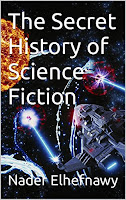Looking back at the Golden Age of science fiction it has seemed to me that H.G. Wells was a hugely important influence. Certainly John Campbell's derivation of inspiration from Wells' The Time Machine in the early story "Twilight" is much discussed--while reading Campbell's discussion of his own ideas about the genre, and how others have interpreted them, has persuaded me that he largely adapted Wells' ideas to his own inclinations (a case I make in Chapter Two of Cyberpunk, Steampunk and Wizardry).
Perhaps unsurprisingly I found myself often thinking of Wells, and in particular what I have tended to view as the summary work capping off his career, The Shape of Things to Come, when recently reading Isaac Asimov's Foundation trilogy, with which Wells, and in particular that then-recent book--scarcely a decade old when Asimov undertook the writing of the Foundation saga--has been less associated. (Instead it is Edward Gibbons' The History of the Decline and Fall of the Roman Empire that Asimov was to speak.)
In both of those tales civilization fell in a manner all too predictable to intelligent observers. And in both a small elite left over from "Before the Fall," with a greater understanding of social reality and a command of critical technical skills, built an organization that sustained the old knowledge and connections, and through its control of essential technology, exerted a civilizing influence (the Air and Sea Control in Wells), not least by letting it consistently outmaneuver the backward, violent elements that attempted to oppose or exploit them for their selfish ends (which maneuvering made the reconstruction of order a far less bloody matter than it would otherwise have been). There is also what both those premises bespeak, a hope for rational control of the course of human life and human history, with such control exercised by scientists and engineers who can apply the same kind of foresight and control they do to physical forces to society, not least by leveraging their various forms of expertise (technological as well as social) into political power.
There even seems some significant resemblance in the narrative structure, if not with Wells' book, then the cinematic adaptation of it, Things to Come. The 1936 movie took Wells' work (which had been written as a precognitive glimpse of an advanced history textbook from the twenty-second century, and read like one) and dramatized it by way of a series of illustrative and allegorical vignettes from the various stages of the history it covered--with the first presenting the experiences of a flier in the world war that wrecks civilization, the second a member of the Control (here known as "Wings Over the World") confronting and defeating a grubby warlord, and then, following a montage depicting the rebuilding of the world on clean, modern lines, the controversy that ensues in the new World State over a planned moon mission. Thus does Asimov's Foundation likewise proceed, not as a history textbook, but through such vignettes showing the work of Foundation founder Hari Seldon, the Foundation's first confrontation with the space age barbarians of Anacreon after the Empire's effective collapse a half century after the first vignette, etc., etc. . . . (entirely befitting, I think, Asimov's view of science fiction as a genre distinguished by its concern for humanity's collective destiny over the destiny of any one individual, a sentiment with which, I think, Wells would have been sympathetic).
Yet along with these impressive similarities I was struck by at least one significant difference reflecting the intellectual inspirations and the politics to which the two writers were permitted to give expression. Asimov reimagined the fall of Rome and the Dark and Middle Ages on a galactic scale, with his Foundation early on appearing a variation on the Catholic Church, using its monopoly of old knowledge and its religious authority to bend the barbarians to its will, with an eye to the restoration of Empire, all as Asimov stressed the specifically intellectual failings of late Galactic Empire culture ("the damming of curiosity," the decline of the scientific ethos, with which Mayor Hardin charged the Foundation's scientists themselves). Certainly the Foundation does evolve, taking on new forms as the galactic situation changes in ways bespeaking a materialist historical sense (with its Church-like aspect giving way to a commercial empire when the "money power" becomes more important), and by the second book there is even an expectation that the new Empire will somehow be better than the version which preceded it--but of that later, better, state we know no details. By contrast Wells, who was more openly radical than any writer had the opportunity to be in the pages of John Campbell's Astounding, and for that matter any really major science fiction writer in Red Scared Cold War America, described not a process of pseudo-Roman decline and Medieval restoration of civilization and its benefits, but explicitly offered a radical critique of the social system that had been before directed at capitalism, the nation-state, the traditional culture of religiosity, nationalism and other elements accompanying them, as out of step with the practical governance of human affairs, as demonstrated when it ineluctably led to economic slump, war and civilizational collapse. The point was therefore not to put what had fallen apart back together, even in tweaked form, but to fill the vacuum with the kind of government the world had really needed all along, and suffered for lacking (explicitly depicted as a scientific, socialist World State clearly, profoundly different from what had stood before).
Still, even allowing for the difference that can itself seem to sum up the tight boundaries within which American genre science fiction developed ("stories based 10,000 years in the future where all the sciences have progressed fabulously except for one," as Mack Reynolds protested in Who Killed Science Fiction?, specifically drawing attention to the feudalism of the Foundation stories), there was still something of the Wellsian regard for science, reason and their potential to order human affairs in a better way that has become much, much less evident in science fiction since, as seen in its proneness to treat the apocalypse not as a challenge to the guardians of civilization, but an occasion to wallow in reptile-brained misanthropy, whether amid the survivalism of the immediate aftermath of civilization's downfall, or the dystopias that, as in The Hunger Games, rose from the ashes to bring the survivors new nightmares.
Book Review: Providence by Max Barry
9 hours ago






